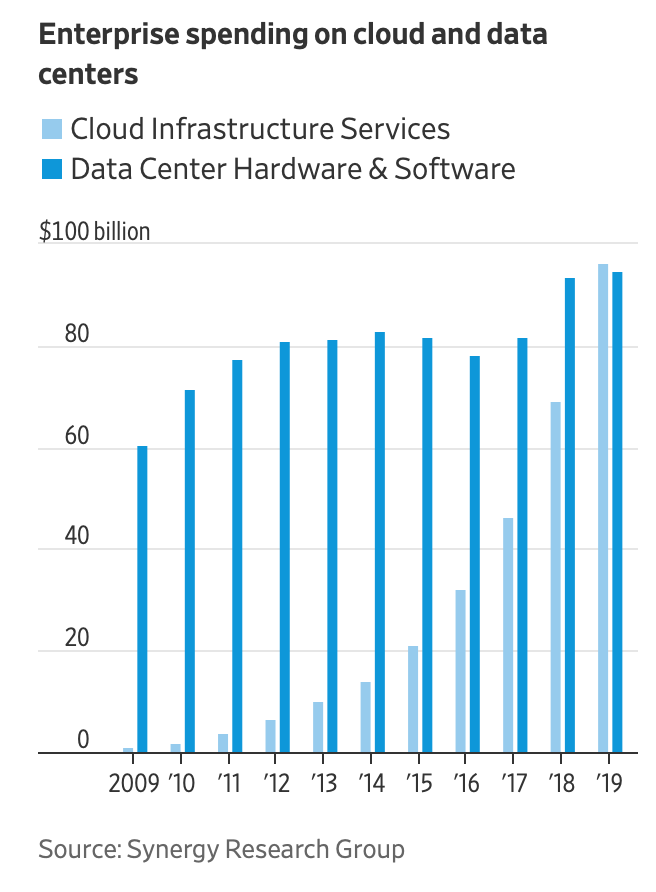Cloud Spending Hits Record Amid Economic Fallout From Covid-19

Companies world-wide spent $34.6 billion on cloud services in the second quarter, up roughly 11% from the previous quarter
By Angus Loten CIO Journal - Aug 3, 2020
Spending on cloud services is surging, as companies shift more business applications online to cope with extended Covid-19 lockdowns, social distancing and other restrictions.
Companies world-wide spent a record $34.6 billion on cloud services in the second quarter, up roughly 11% from the previous quarter and 30% from the same period last year, according to research firm Canalys.
Led by Amazon.com Inc.’s Amazon Web Services and Microsoft Corp. ’s Azure cloud unit, the spending gains were fueled by soaring corporate demand for cloud-based collaboration and remote working tools, e-commerce, remote learning, and content streaming, the firm said.
Jones Lang LaSalle Inc., one of the world’s largest commercial real estate services firms, said it shifted roughly 90% of its employees to remote work when the coronavirus struck, representing about 90,000 workers.
The company, known as JLL, had been expanding its use of cloud services in recent years, as it shut down costly in-house data centers and increased adoption of cloud-based collaboration and productivity tools, said Yishai Lerner, co-CEO of JLL Technologies, a division of the company that oversees enterprise information technology.

“When the world moved to remote work at the start of the pandemic, this cloud investment really paid off,” Mr. Yishai said. “We plan to continue investing in cloud,” he added, citing benefits such as faster time-to-market for new real estate technology tools, flexibility and lower costs.
Across all sectors, strong spending on cloud services comes amid the economic fallout sparked by the crisis, which saw the pace of U.S. annual growth decline by a seasonally adjusted rate of 32.9% in the second quarter—the sharpest decline in more than 70 years of record-keeping, the Commerce Department reported last week.
“Organizations that had applications running in on-premises environments were compelled to move them to the cloud, because if people couldn’t get to work, that data center was useless,” said Sid Nagy, a vice president at IT consulting firm Gartner Inc.
Cloud-service providers essentially rent computer capacity and business applications to companies online on an as-needed basis, often charged through a negotiated subscription rate.
Mr. Nagy said cloud services enable chief information officers to spend less cash upfront, rather than scaling up on-premises data-center capability or acquiring traditional licensed software.
Matthew Ball, a chief analyst at Canalys, said cloud services that have supported emergency business-continuity efforts will prove equally important when businesses reopen, by underpinning workplace safety tools, such as occupancy monitoring and contract tracing.
A June report by technology-research firm International Data Corp. estimated that more than two thirds of global organizations in every industry are using cloud-based systems or applications in some form, including high adoption rates in manufacturing, health care and financial services.
“Companies already living in the cloud are doubling down, while those late to the game are eagerly trying to catch up, to both save their business and remain competitive,” said Erik Newmark, program vice president at International Data Corp.
Mr. Newmark, who oversees the firm’s coverage of Software-as-a-Service, enterprise apps, industry cloud and digital commerce, said companies with a head start in deploying cloud systems are proving to be much more resilient in weathering the crisis, compared with slower adopters.
“Growing demand for cloud services has followed suit,” he said.



